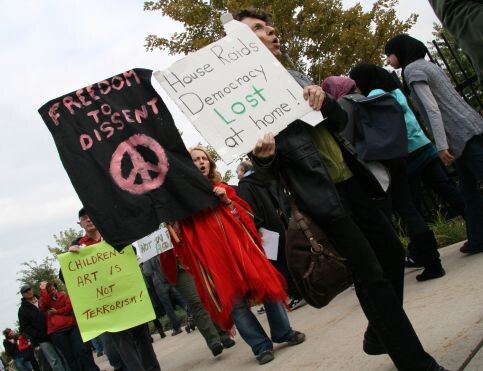The Electronic Intifada 30 September 2010

Chicagoans protest against the FBI raids, 27 September 2010. (Maureen Clare Murphy)
Activists are planning new actions after rallies took place in dozens of cities across the United States to protest raids by the FBI on homes of anti-war and Palestine and Colombia solidarity activists in Minneapolis and Chicago last week. The FBI also subpoenaed at least 14 activists in Illinois, Minnesota and Michigan to testify at a grand jury.
Hundreds of protestors gathered outside FBI offices in Chicago and Minneapolis on Monday, 27 September and media reported on similar rallies in other cities including Los Angeles, Atlanta, Kalamazoo and Dallas. Organizers have announced a national call-in day to the US president and attorney general on 4 October and day of action on 5 October in order to maintain pressure on the US government to end the raids and grand jury proceedings.
“Those targeted [by the FBI raids] are well-known leaders in the anti-war movement and many helped to organize the huge protest against the Republican National Convention in St. Paul, Minnesota in September 2008,” the newly-formed Committee to Stop FBI Repression said in a statement. It added that the targeted activists “are involved with many groups, including the Palestine Solidarity Group, Students for a Democratic Society, the Twin-Cities Anti-War Committee, the Colombia Action Network, Fight Back! newspaper, the Freedom Road Socialist Organization and the National Committee to Free Ricardo Palmera” (“Support Anti-war and International Solidarity Activists” leaflet [PDF])
No arrests or charges were made in the raids and the FBI has described there to be “no imminent threat” to the public, leading the targets of the raids and supporters to describe the FBI’s investigation as a “giant fishing expedition” intended to intimidate the anti-war and solidarity movements.
Just days before the raids, the US Justice Department Inspector General released a 289-page report in which it criticized the FBI for spying on activists between 2002 and 2006. The report found that “The FBI improperly spied on American activists involved in First Amendment-protected activities and mischaracterized nonviolent civil disobedience as terrorism which improperly placed activists on terrorist watch lists” (“FBI improperly spied on activists, says Justice Department Inspector General,” American Civil Liberties Union, 20 September 2010).
The Justice Department’s investigation, undertaken after a Freedom of Information Act request by the American Civil Liberties Union, “uncovered evidence that the FBI was chilling political association and improperly investigating peaceful advocacy groups.”
The FBI claims that its latest raids in Chicago and Minneapolis are related to an investigation concerning “material support of terrorism,” and demands in the subpoenas any information the targets might hold related to the Popular Front for the Liberation of Palestine, the Revolutionary Armed Forces of Colombia and Hizballah, all considered “terrorist organizations” by the US State Department.
In June of this year, the Supreme Court expanded the definition of “material support” to include “expert advice,” “training,” “service” and “personnel,” terms criticized by law groups as being vague, and threatening the constitutional right to free speech. This broad definition of “material support” could even include such activities as specifically advising a group considered “terrorist” by the US to abandon violence and use strictly nonviolent means to achieve its goals.
During a Minneapolis rally against the raids, National Lawyers Guild member Bruce Nestor illustrated the sweeping scope of the material support law. Nestor said that had the law been in effect during the South Africa anti-apartheid movement, when US President Ronald Reagan had declared Nelson Mandela’s African National Congress a “terrorist organization,” “the entire anti-apartheid movement would have been guilty of providing material support for terrorism” (Video available on YouTube).
Minnesota activist Tracy Molm, whose home was raided, told Al-Jazeera English that the FBI is “trying to intimidate us who are standing in solidarity with the people of Palestine and Colombia” (“FBI targets US Palestine activists,” 29 September 2010). Protesters in several cities carried signs reading, “From Colombia to Palestine, Solidarity is not a Crime.”
The Committee to Stop FBI Repression is calling for a national call-in day on Monday, 4 October to US President Barack Obama and US Attorney General Eric Holder. They are asking supporters to demand that the government stop the repression against anti-war and international solidarity activists, return all confiscated materials and call for an end the grand jury proceedings against the activists. The national committee is also calling for solidarity actions at FBI and federal buildings throughout the US on Tuesday, 5 October, the first federal grand jury court date. Activists in Chicago, where the first of the subpoenaed activists are to report to a grand jury, are planning a day-long vigil starting at 8:30am that day.
Related Links
